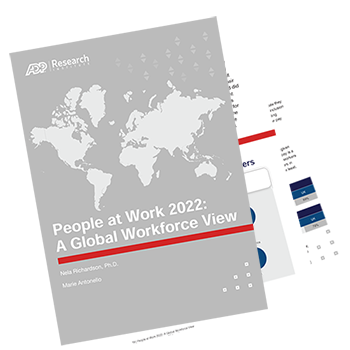What do workers want and how can your business respond?
As companies begin to recover from the Covid-19 pandemic, ADP’s Research Institute® conducted an online survey, with 32,924 workers in 17 countries worldwide taking part between 1 November and 24 November 2021. This included over 8,685 working exclusively in the gig economy.
The research had two aims: to take the temperature of worker sentiment and support businesses in becoming more forward thinking, competitive, and therefore, resilient employers.
The following key themes emerged:

Job satisfaction
Nine in 10 (90%) are satisfied in their current job, although 41% are only ‘somewhat satisfied’. Optimism about work is robust at 88% but below pre-pandemic levels.

Pay and benefits
Salary is top priority, with 65% wanting more hours for more pay. Yet workers are still giving away more than a working day (8.5 hours) of unpaid weekly overtime.

Mental health
Work stress is at critical levels, with 67% experiencing it at least once a week, up from 62% pre-pandemic. One in seven (15%) feel stressed daily and 53% believe their performance is suffering.

Work is evolving
Personal wellbeing and life outside work are in sharp focus - intensifying the desire for better working conditions, greater flexibility, remote work and a fairer work culture.

How employers can navigate the changing workplace
The survey found that work is no longer just about salary and other financial benefits, plus a few perks. To foster a sense of job satisfaction and security among staff, businesses need to consider the following:
- Pay and progression
- Work-life balance
- Wellbeing and family
- Corporate values
Currently the stakes are higher than ever before, with a shift in the previous two years in how and where we work sparking a rethink of priorities. Workers are willing to walk away if employers don’t meet their standards on various issues, such as flexible working and diversity, equity and inclusion (DEI) policies. The research highlighted that two-thirds (64%) of staff would consider looking for a new job if forced to return to the office full-time.
How employers can help
Employers will need to:
- Ask the right questions to understand workers better
- Realise how the prevailing mindset has altered
- Adjust their approach accordingly.
Employers may have to make bold decisions and challenge assumptions, but many companies have become adept at that in the previous two years.
Re-evaluating work
Job security proved elusive over the last couple of years, with many workers losing their jobs or being put on furlough. As a result, this has triggered a re-evaluation of what job security means to staff. It’s increasingly clear that workers want more from their employers, with many wanting to work for companies with a culture and values aligned with their own. A sense of job security now relates to the whole, increasingly diverse, array of benefits that employers are – or not - offering on an individual and corporate level. This has major implications for staff recruitment and retention, particularly when employers are having to attract a remote talent pool from a wider geographic area.
Let’s take a closer look:

Shrinking Job security
Over half of workers (54%) say job security is important, but only a quarter of respondents (25%) think their job or industry is secure. That’s down from over a third (36%) in 2021.

Changing career
The vast majority (71%) of workers say they have considered a major career change over the last 12 months. Meanwhile, 23% are actively looking for another job.

Work is evolving
With 21% considering becoming self-employed, 20% want to take a temporary break or go part-time (19%). Globally, 52% have thought about relocating within the country where they live.

A more holistic view of work
For around a third of workers, flexible hours or enjoying work are important to them (33% and 32% respectively). Almost a quarter (23%) say career progression is a priority.

Work-life balance
Two thirds (65%) would like more hours for more pay. Seven in 10 (71%) want more flexible working hours, such as a four-day week, and around half (52%) would accept a pay cut if it guaranteed flexibility.

Diversity, equity & inclusion (DEI)
DEI is now a make-or-break issue. Nearly six in 10 (59%) workers believe their employer has a gender pay equality policy and 57% are thought to have a diversity and inclusion policy.

Why employers need to listen: the talent drain
Around a third of employers (32%) talk about the importance of DEI policies but either don’t have one, or never mention them at all (34%). Employers risk putting themselves at a competitive disadvantage if they fail to seek out the best candidates from the widest pool.
Businesses may struggle to keep hold of highly skilled or qualified women, or workers from a diverse range of ethnicities and backgrounds. This impact could adversely affect the way the company, its values and brand, are perceived by staff and candidates, plus other stakeholders such as customers and shareholders.
The figures support this:
- Approximately three quarters (76%) of workers would consider looking for a new job if they discovered there was an unfair gender pay gap or no diversity and inclusion (DEI) policy at their company (76%)
- Though women are more likely to say so, men are not far behind, and younger workers feel particularly strongly.

Spotlight on: Asia Pacific
Workers want more:
Almost nine in 10 (88%) of Indian workers have considered changing career, compared to 75% in Singapore, 68% in Australia and 61% in China.
Only one in eight (12%) Indians and Singaporeans feel that their job or industry is secure.
Indians are the most entrepreneurial regionally, with almost three in 10 (29%) contemplating starting their own business.

Workers choosing different priorities
Overall, the research shows that workers are thinking harder than ever before about what they really want out of work - and life. The list might include higher pay, greater flexibility, better support, new challenges, increased recognition, improved prospects or a more inclusive, fairer culture. Employers would do well to take note. HR teams have a vital role as mediators between both parties, helping to align needs and aspirations to shore up morale at a time of ongoing radical change and huge uncertainty. This will be no easy task, but for those employers that can get it right the reward could be a more stable, committed and productive workforce.
Use our research as a tool to support your business transformation.
Get your report to discover key insights to stay competitive and motivate your employees.

Workers want change. What do you need to know?





